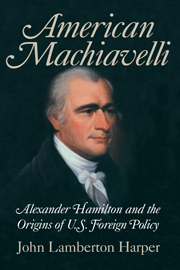Book contents
- Frontmatter
- Contents
- List of Illustrations
- Acknowledgments
- Miscellaneous Frontmatter
- Introduction
- PART I THE COMING OF NECESSITY
- PART II BATTLE LINES ARE DRAWN
- PART III SEIZING THE HELM
- 8 The Birth of American Neutrality, February–May 1793
- 9 “A Most Distressing Dilemma,” May–December 1793
- 10 Hamilton and the Crisis of 1794
- 11 The Jay Treaty
- PART IV INFORMAL ADVISER TO THE PRINCE
- PART V A PRINCE IN HIS OWN RIGHT?
- PART VI THE LESSER OF EVILS
- Conclusion: Hamilton Then and Now
- Notes
- Bibliography
- Index
8 - The Birth of American Neutrality, February–May 1793
Published online by Cambridge University Press: 05 April 2013
- Frontmatter
- Contents
- List of Illustrations
- Acknowledgments
- Miscellaneous Frontmatter
- Introduction
- PART I THE COMING OF NECESSITY
- PART II BATTLE LINES ARE DRAWN
- PART III SEIZING THE HELM
- 8 The Birth of American Neutrality, February–May 1793
- 9 “A Most Distressing Dilemma,” May–December 1793
- 10 Hamilton and the Crisis of 1794
- 11 The Jay Treaty
- PART IV INFORMAL ADVISER TO THE PRINCE
- PART V A PRINCE IN HIS OWN RIGHT?
- PART VI THE LESSER OF EVILS
- Conclusion: Hamilton Then and Now
- Notes
- Bibliography
- Index
Summary
Introduction
One of Machiavelli’s biographers describes Florence in the years 1510–12, as “caught like an earthen pot between two great vessels of bronze.” The republic found itself in the middle of renewed hostilities between its ally, France, and an opposing coalition, including Spain, England, the Holy Roman Emperor, and the pope, who condemned France’s heretical conduct and sought to roll back its foreign acquisitions. Though Machiavelli never saw a clear alternative to the alliance, the danger inherent in Florence’s traditional ties with France was a central theme of his career. The connection frequently entangled Florence in conflicts with France’s enemies, with the French rarely prepared to provide concrete help.
During the third of his four missions to France (June–October 1510), Machiavelli urged Louis XII to avoid armed conflict and hoped Florence would be able to mediate the quarrel between the French king and the pope. Though he feared and opposed war, he concluded that “the hubris and the power” (la superbia e la potenza) of France would force Florence to become involved. Therefore the city should make virtue of necessity and try to extract a price from the French. On his return home, he attempted to strengthen the republic’s capacity to resist incursions by any of the parties into its territory. But throughout the final crisis of the republic, Florence was crippled by serious internal divisions, for example, over the question of standing military forces. After France’s withdrawal from Italy, and the sack of Prato by the Spanish, the republic quickly collapsed from within.
- Type
- Chapter
- Information
- American MachiavelliAlexander Hamilton and the Origins of U.S. Foreign Policy, pp. 103 - 114Publisher: Cambridge University PressPrint publication year: 2004



